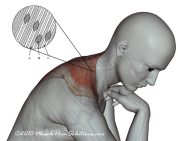What Causes Headaches...
And How Can You Treat Them?
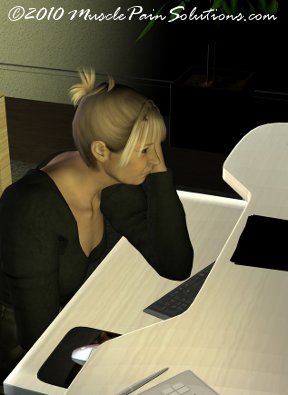
When trying to figure out what causes headaches, many factors need to be considered. Common causes include dehydration, trigger points, poor posture, and stress. I always recommend that headache suffers make sure they are drinking enough water as a first step, because dehydration will contribute to almost all common headache types.
Before using this page to work on your headache, you should rule out danger. If your headache has any of the following features, seek immediate medical attention. You could be suffering from a life threatening condition.
- A sudden, new severe headache
- Fever, shortness of breath, stiff neck, or rash
- Severe nausea and vomiting
- Headaches that occur after a head injury or accident
- Getting a new type of headache after age 55
- Neurological symptoms such as weakness, dizziness, sudden loss of balance, numbness or tingling, paralysis, speech difficulties, mental confusion, seizures, personality changes, or vision changes
If you aren't suffering from any of these conditions, then use the following check list.
Checklist for what causes headaches for you
- Make sure you are drinking 8-10 glasses of water per day, consuming about 1/2 teaspoon of salt, and that you urine is light yellow to clear.
- Figure out your headache type (listed below) and look at the specific recommendations for that type.
- Look up the relevant muscles that may be referring pain to the affected area of your head (illustrated below) and treat diligently with trigger point massage and stretching.
- Try to figure out if there is anything you might be doing to re-aggravate the muscles on a regular basis, such as poor ergonomics or body mechanics.
- If you still do not get any relief, or only limited relief, seek professional help.
Headache Types
The most common types of headaches are migraine and tension headache. Most headaches are somewhere in between these types. If the headache is coming more from the muscles, it is named a tension headache. If it coming more from nerves and blood flow, it is named a migraine. You can compare what causes these headaches here.
Tension Headaches
Tension headaches usually happen in the afternoon or evening. They feel like a constant dull ache or tightness anywhere in the head. A tension headache can also feel like a tight band around parts of the head. These headaches can last from 1/2 hour to days or even weeks, and can occur daily. They are often stress related. In my experience, both with myself and in practice, these headaches are often caused by a combination of factors, but primarily by trigger points and dehydration. Click here for more symptoms. Learn how to treat them here.
Chronic Tension Headaches
Do you suffer headaches most days of the week, and have been doing so for over three months? Welcome to the club of chronic headaches... I was once a member myself. These are a little harder to beat than the occasional headache, but it can be done. Follow the suggestions for tension headaches above, then come here for a few more pointers on what might be perpetuating your headaches.
Migraine Headache
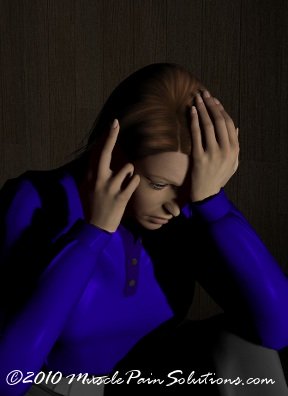
Sitting in a dark quiet room, feeling the horrible pounding above one eye, feeling nauseous or even vomiting... sound familiar? It will if you have had a migraine headache. These headaches can be preceded by an aura which is happens shortly before the headache which is often, though not always, visual in nature. The suffer can notice a blind spot or flashing lights or geometric lines. What causes headaches that can make you feel like something is trying to get out of your head? There are a variety of theories involving blood vessels in the brain, nerves, and musculoskeletal factors. Migraine headaches are more complex and have a wide variety of triggers including sensitivities to food, environmental factors, and hormones. While you may not be able to beat these entirely on your own, here is some information that will help you start reducing the frequency of these awful headaches.
Post Traumatic Headaches
These can be a concern since there is a possibility of post concussive syndrome or subdural hematoma (slow brain bleed). However, if you have been to the doctor, and other more serious issues are ruled out, there are things you can do for this type of headache. Many of the symptoms can arise from trigger points that have developed in various neck muscles that send their pain to the head. Use the location of the headache to guide you below.
Medication Related Headaches
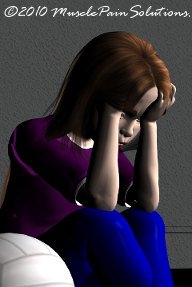
There are two types of headaches in this category. Headaches can be a common side effect of many prescription medications. If you are on any medications, be sure to look up the side effects. It can also be caused by an interaction between medications that you are taking together. This may be what causes the headaches. The other type of medication related headache is a rebound headache. These happen when medication is taken frequently for headaches. Then, when the medication is not taken, it creates a headache. Basically, you need to reduce the frequency that you use the medication and use other methods to control your headaches.
Headaches in Children
While children can have any of the above headaches, it has been my experience that what causes headaches most frequently in children (if there has not been any trauma) is dehydration. But, there is also the issue of book bags that are too heavy, and changing eyesight. And of course, children can get headaches for the same reasons adults get headaches... to learn more, click here.
Guide for what causes headaches by location
The following headache types are broken down by location. The pages describe which muscles refer pain to that area.
Occipital Headache
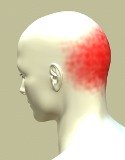
An occipital headache is defined as head pain in the back of the head. It can feel like someone has a vice grip on your head. What causes headaches in the back of the head? Usually trigger points in the upper trapezius muscles and other neck muscles. This is a common place to have tension headaches, usually made worse with stress. Learn more about what you can do to get rid of these headaches here.
Frontal Headache
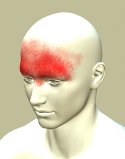
As you would suspect from the name, frontal headaches are those in the front of your head, in your forehead above the eyes. They can also feel like they are behind your eye as well. Again, while there are some other causes for these headaches that will be discussed, the most common cause lies in a muscle on the front of your neck called the sternocleidomastoid, or the SCM. There are some muscles at the base of your skull called the suboccipitals that can give you the pain that feels like it is behind the eyes.
Headache Behind Eyes
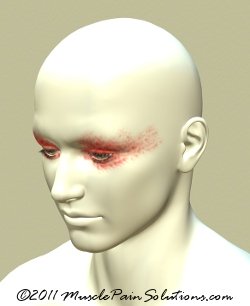
Headache behind the eyes can be sharp, or feel more like a fullness or pressure behind the eyes. Migraines are frequently located in this area, though they tend to hurt more on one side than the other. Sometimes the pain may be in the eyebrows as well. These headaches can interfere with vision at times, causing blurring, or difficulty focusing for reading. They are caused by a variety of muscles in head and neck.
Temple Headache (aka Temporal Headache)
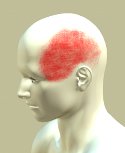
Temple headache or Temporal headaches are on one or both sides of your head. They generally feel like a pressure or ache over your temples. Your pain can increase with chewing, as one of the muscles involved is a chewing muscle. What causes headaches in the temples? Often the same culprits that cause the headaches in the front and the back: Upper trapezius and SCM. Again, there are other causes, but these are the most frequent.
TMJ Headache
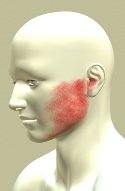
These headaches originate near the temporomandibular joint, or the TMJ, but can spread up into the same areas shown above in the temple headache. While these headaches can be from complicated jaw problems, often times these pains are caused by a few trouble maker muscles in the mouth that you can treat on your own. At the very least, it is helpful to eliminate the component coming from the muscles to see what problems are left that need to be dealt with professionally. These same muscles can cause what feels like a toothache.
Sinus Headache
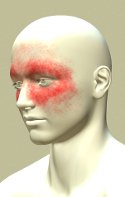
There is nothing to break your concentration like the constant pressure in your face from sinus issues. But what causes headaches in the sinuses? You may be surprised to learn that it is not always coming from problems inside the sinuses — the jaw muscles mentioned above plus the SCM (sternocleidomastoid), as well as a few others, can create what feels like sinus pressure, and the SCM can even cause an increase in mucus production. So if your mucus is not green, this self treatment is worth a shot. Even if you have a true sinus infection, I have a sinus headache remedy for that as well.
Vertex Headache
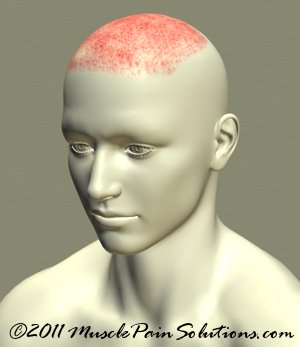
A headache on top of your head is called a vertex headache. These are fairly uncommon, and are usually caused by trigger points in one of two muscles: the SCM or the splenius capitus. The quality is often like a pressure and is usually associated with a tension headache.
Professional Help
If the home remedies for headaches listed above are not enough, you may need to get professional help. Try to find a practitioner that specializes in trigger point therapy to help you work through the above steps, and determine if there are other factors influencing your headaches. You could have a more serious condition, so find help.
I often find that lack of motion in the upper neck can create, or at least contribute to headaches. This can be addressed with chiropractic manipulation. This is a good article on how to find a good chiropractor. I also find that if muscles are not responding to trigger point massage and stretching, that they need to be addressed with Graston or Gua sha. These are techniques that very effectively get rid of scar tissue. Some people respond better to dry needling of the trigger points which can be done by an acupuncturist (though they don't all do this, so inquire).
Hopefully this information will be able to help you discover what causes headaches for you and help you find the right kind of care for yourself. If you are having trouble figuring this out, send me an email and I'll see if I can help.
Return from What Causes Headaches to Home.


